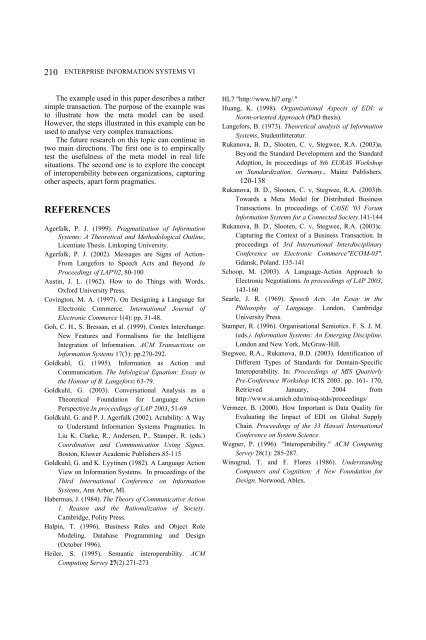Back Room Front Room 2
Back Room Front Room 2
Back Room Front Room 2
Create successful ePaper yourself
Turn your PDF publications into a flip-book with our unique Google optimized e-Paper software.
210 ENTERPRISE INFORMATION SYSTEMS VI<br />
The example used in this paper describes a rather<br />
simple transaction. The purpose of the example was<br />
to illustrate how the meta model can be used.<br />
However, the steps illustrated in this example can be<br />
used to analyse very complex transactions.<br />
The future research on this topic can continue in<br />
two main directions. The first one is to empirically<br />
test the usefulness of the meta model in real life<br />
situations. The second one is to explore the concept<br />
of interoperability between organizations, capturing<br />
other aspects, apart form pragmatics.<br />
REFERENCES<br />
Agerfalk, P. J. (1999). Pragmatization of Information<br />
Systems: A Theoretical and Methodological Outline,<br />
Licentiate Thesis. Linkoping University.<br />
Agerfalk, P. J. (2002). Messages are Signs of Action-<br />
From Langefors to Speech Acts and Beyond. In<br />
Proceedings of LAP'02, 80-100<br />
Austin, J. L. (1962). How to do Things with Words,<br />
Oxford University Press.<br />
Covington, M. A. (1997). On Designing a Language for<br />
Electronic Commerce. International Journal of<br />
Electronic Commerce 1(4): pp. 31-48.<br />
Goh, C. H., S. Bressan, et al. (1999). Contex Interchange:<br />
New Features and Formalisms for the Intelligent<br />
Integration of Information. ACM Transactions on<br />
Information Systems 17(3): pp.270-292.<br />
Goldkuhl, G. (1995). Information as Action and<br />
Communication. The Infological Equation: Essay in<br />
the Honour of B. Langefors: 63-79.<br />
Goldkuhl, G. (2003). Conversational Analysis as a<br />
Theoretical Foundation for Language Action<br />
Perspective.In proceedings of LAP 2003, 51-69<br />
Goldkuhl, G. and P. J. Agerfalk (2002). Actability: A Way<br />
to Understand Information Systems Pragmatics. In<br />
Liu K. Clarke, R., Andersen, P., Stamper, R. (eds.)<br />
Coordination and Communication Using Signes.<br />
Boston, Kluwer Academic Publishers.85-115<br />
Goldkuhl, G. and K. Lyytinen (1982). A Language Action<br />
View on Information Systems. In proceedings of the<br />
Third International Conference on Information<br />
Systems, Ann Arbor, MI.<br />
Habermas, J. (1984). The Theory of Communicative Action<br />
1. Reason and the Rationalization of Society.<br />
Cambridge, Polity Press.<br />
Halpin, T. (1996). Business Rules and Object Role<br />
Modeling. Database Programming and Design<br />
(October 1996).<br />
Heiler, S. (1995). Semantic interoperability. ACM<br />
Computing Servey 27(2).271-273<br />
HL7 "http://www.hl7.org/."<br />
Huang, K. (1998). Organizational Aspects of EDI: a<br />
Norm-oriented Approach (PhD thesis).<br />
Langefors, B. (1973). Theoretical analysis of Information<br />
Systems, Studentlitteratur.<br />
Rukanova, B. D., Slooten, C. v, Stegwee, R.A. (2003)a.<br />
Beyond the Standard Development and the Standard<br />
Adoption. In proceedings of 8th EURAS Workshop<br />
on Standardization, Germany., Mainz Publishers.<br />
120-138<br />
Rukanova, B. D., Slooten, C. v, Stegwee, R.A. (2003)b.<br />
Towards a Meta Model for Distributed Business<br />
Transactions. In proceedings of CAiSE '03 Forum<br />
Information Systems for a Connected Society.141-144<br />
Rukanova, B. D., Slooten, C. v, Stegwee, R.A. (2003)c.<br />
Capturing the Context of a Business Transaction. In<br />
proceedings of 3rd International Interdisciplinary<br />
Conference on Electronic Commerce"ECOM-03",<br />
Gdansk, Poland. 135-141<br />
Schoop, M. (2003). A Language-Action Approach to<br />
Electronic Negotiations. In proceedings of LAP 2003,<br />
143-160<br />
Searle, J. R. (1969). Speech Acts. An Essay in the<br />
Philosophy of Language. London, Cambridge<br />
University Press.<br />
Stamper, R. (1996). Organisational Semiotics. F. S. J. M.<br />
(eds.). Information Systems: An Emerging Discipline.<br />
London and New York, McGraw-Hill.<br />
Stegwee, R.A., Rukanova, B.D. (2003). Identification of<br />
Different Types of Standards for Domain-Specific<br />
Interoperability. In: Proceedings of MIS Quarterly<br />
Pre-Conference Workshop ICIS 2003. pp. 161- 170,<br />
Retrieved January, 2004 from<br />
http://www.si.umich.edu/misq-stds/proceedings/<br />
Vermeer, B. (2000). How Important is Data Quality for<br />
Evaluating the Impact of EDI on Global Supply<br />
Chain. Proceedings of the 33 Hawaii International<br />
Conference on System Science.<br />
Wegner, P. (1996). "Interoperability." ACM Computing<br />
Servey 28(1): 285-287.<br />
Winograd, T. and F. Flores (1986). Understanding<br />
Computers and Cognition: A New Foundation for<br />
Design. Norwood, Ablex.









